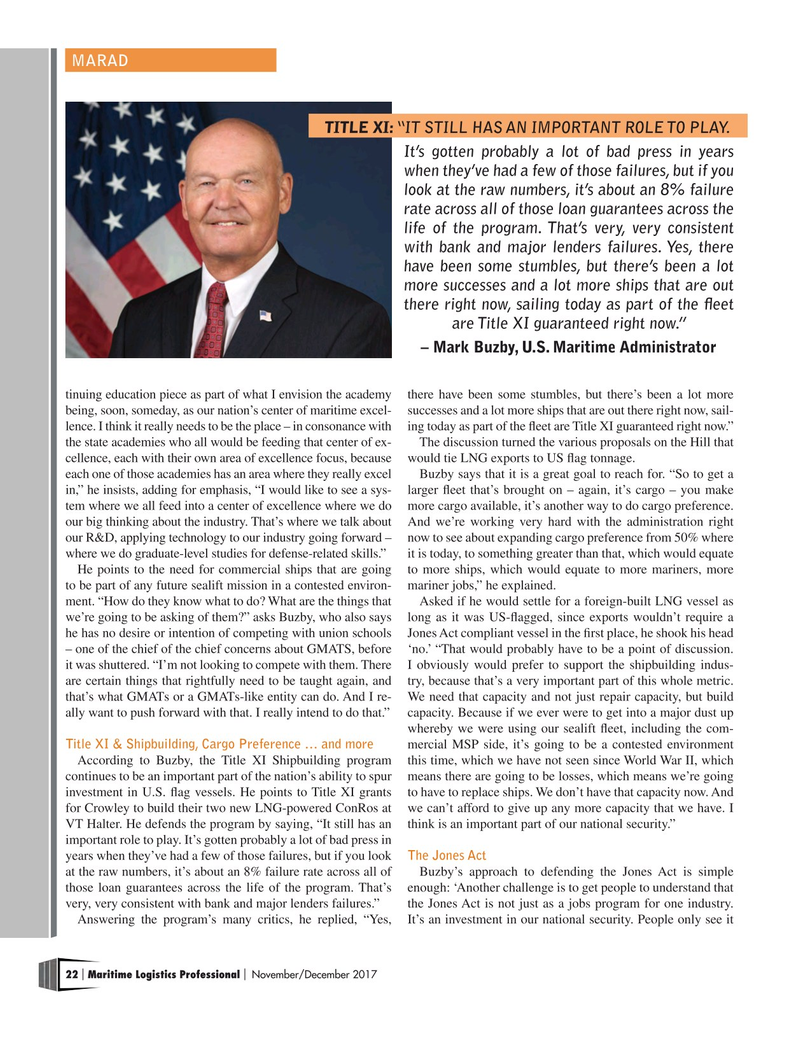
Page 22: of Maritime Logistics Professional Magazine (Nov/Dec 2017)
GREEN PORTS
Read this page in Pdf, Flash or Html5 edition of Nov/Dec 2017 Maritime Logistics Professional Magazine
MARAD
TITLE XI: “IT STILL HAS AN IMPORTANT ROLE TO PLAY.
It’s gotten probably a lot of bad press in years when they’ve had a few of those failures, but if you look at the raw numbers, it’s about an 8% failure rate across all of those loan guarantees across the life of the program. That’s very, very consistent with bank and major lenders failures. Yes, there have been some stumbles, but there’s been a lot more successes and a lot more ships that are out there right now, sailing today as part of the feet are Title XI guaranteed right now.” – Mark Buzby, U.S. Maritime Administrator tinuing education piece as part of what I envision the academy there have been some stumbles, but there’s been a lot more being, soon, someday, as our nation’s center of maritime excel- successes and a lot more ships that are out there right now, sail- lence. I think it really needs to be the place – in consonance with ing today as part of the feet are Title XI guaranteed right now.” the state academies who all would be feeding that center of ex- The discussion turned the various proposals on the Hill that cellence, each with their own area of excellence focus, because would tie LNG exports to US fag tonnage.
each one of those academies has an area where they really excel Buzby says that it is a great goal to reach for. “So to get a in,” he insists, adding for emphasis, “I would like to see a sys- larger feet that’s brought on – again, it’s cargo – you make tem where we all feed into a center of excellence where we do more cargo available, it’s another way to do cargo preference. our big thinking about the industry. That’s where we talk about And we’re working very hard with the administration right our R&D, applying technology to our industry going forward – now to see about expanding cargo preference from 50% where where we do graduate-level studies for defense-related skills.” it is today, to something greater than that, which would equate
He points to the need for commercial ships that are going to more ships, which would equate to more mariners, more to be part of any future sealift mission in a contested environ- mariner jobs,” he explained. ment. “How do they know what to do? What are the things that Asked if he would settle for a foreign-built LNG vessel as we’re going to be asking of them?” asks Buzby, who also says long as it was US-fagged, since exports wouldn’t require a he has no desire or intention of competing with union schools Jones Act compliant vessel in the frst place, he shook his head – one of the chief of the chief concerns about GMATS, before ‘no.’ “That would probably have to be a point of discussion. it was shuttered. “I’m not looking to compete with them. There I obviously would prefer to support the shipbuilding indus- are certain things that rightfully need to be taught again, and try, because that’s a very important part of this whole metric. that’s what GMATs or a GMATs-like entity can do. And I re- We need that capacity and not just repair capacity, but build ally want to push forward with that. I really intend to do that.” capacity. Because if we ever were to get into a major dust up whereby we were using our sealift feet, including the com-
Title XI & Shipbuilding, Cargo Preference … and more mercial MSP side, it’s going to be a contested environment
According to Buzby, the Title XI Shipbuilding program this time, which we have not seen since World War II, which continues to be an important part of the nation’s ability to spur means there are going to be losses, which means we’re going investment in U.S. fag vessels. He points to Title XI grants to have to replace ships. We don’t have that capacity now. And for Crowley to build their two new LNG-powered ConRos at we can’t afford to give up any more capacity that we have. I
VT Halter. He defends the program by saying, “It still has an think is an important part of our national security.” important role to play. It’s gotten probably a lot of bad press in years when they’ve had a few of those failures, but if you look The Jones Act at the raw numbers, it’s about an 8% failure rate across all of Buzby’s approach to defending the Jones Act is simple those loan guarantees across the life of the program. That’s enough: ‘Another challenge is to get people to understand that very, very consistent with bank and major lenders failures.” the Jones Act is not just as a jobs program for one industry.
Answering the program’s many critics, he replied, “Yes, It’s an investment in our national security. People only see it 22 Maritime Logistics Professional November/December 2017 | |

 21
21

 23
23
